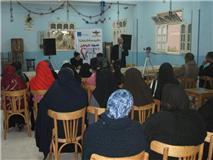The Maat Foundation for Peace, Development and Human Rights continued to implement seminars for citizens, which aimed to spread awareness of decentralization and its social and political variables, as well as monitor and discuss citizens' problems related to public services and the role of local bodies in facing them, as the Foundation held two seminars, the first was in the Belbeis Center in Sharkia Governorate on Wednesday corresponding to December 29, 2010 in cooperation with the Eastern Youth Association for Development, while the second session was held at the Al-Saff Center in Helwan Governorate on Friday, December 31, 2010 in cooperation with the Yalla Nsharek Association for Social Development.
The seminars come in the context of the activities of the Citizen's Voice (2) project implemented by the Maat Foundation for Peace, Development and Human Rights with funding from the Future Foundation, which seeks to build the capacities of different community parties in dealing with decentralization, and to develop effective and innovative mechanisms to monitor the needs of citizens and evaluate the quality of public services provided by Before the executive authorities, the project also works to spread the culture of decentralization in the Egyptian society and the effective employment of local and mass media in support of decentralization and monitoring the needs of citizens.
The seminars are one of the components of the program to raise citizens' awareness of decentralization in six governorates, which aims to reach about ten thousand citizens in the field through public discussion panels and simplified guidebooks, in addition to an unlimited number of internet users through the Citizen Voice program broadcast on Radio Radio Maat electronic magazine and the electronic citizen voice magazine, which are issued monthly.
The seminars are considered one of the components of a program of raising citizens' awareness of decentralization in five governorates, which is targeted to reach about ten thousand people through public panel discussions and simplified manuals, along with an unlimited number of Internet users through the citizen's voice which is broadcast on Radio Maat electronic magazine and electronic citizen's voice issuing from the project.
The seminar at the Belbeis Center concluded with a set of urgent problems that the citizens of the center suffer from, the most important of which is the problem of preventing rice cultivation in Belbeis by government decisions that did not take into account the needs of farmers, in addition to the problem of contaminated and unfit for use drinking water, which forces people in some areas to buy Drinking water, as citizens complained about the unjustified rise in the prices of butane cylinders, and finally, the people paid attention to the problem of garbage and its accumulation despite the high value that gets under this item in the electricity bill.
In the class center, the problems raised by the citizens intersected with some of the problems of the people of Belbeis and took a distinct nature in others, for it was the problem of garbage and its accumulation despite the collection of fees to get rid of the problems in which the two centers are similar, although they are located in two different and geographically distant governorates, one in the south of Cairo and the second in Its northeast.
While the problem of the sewage canal that penetrates the center of the classroom and causes serious environmental pollution, as it narrates - despite the law - areas of crops that are used in human food, in addition to that, class citizens presented problems of the quality of their suffering in installing electricity meters for new buildings As a result of officials' intransigence and high fees, as well as poor transportation and transportation in the center.
Participants in the discussion groups agreed on the need to move on more than one level to solve these problems, by interfering with the local popular councils through the hearings that will be held in the third phase of the project, in addition to putting their problems on the table of the mass media and documenting the violations they are exposed to. In sound and image, to force the officials to take positive action to solve these problems.
shortlink: https://maatpeace.org/en/?p=30634












